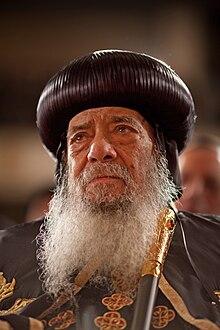Pope Shenouda III of Alexandria
From Wikipedia, the free encyclopedia
| His Holiness Pope Shenouda III | |
|---|---|
| 117th Pope of Alexandria & Patriarch of All Africa on the Holy Apostolic See of St. Mark the Evangelist of the Coptic Orthodox Church of Alexandria | |

Pope Shenouda III
| |
| Native name |
|
| Papacy began | 14 November 1971 |
| Papacy ended | 17 March 2012 |
| Predecessor | Cyril VI |
| Successor | Tawadros II |
| Orders | |
| Ordination | 1954 (Priesthood) |
| Consecration | 30 September 1962 (Episcopal) |
| Personal details | |
| Birth name | Nazeer Gayed Roufail نظير جيد روفائيل |
| Born | 3 August 1923 Abnub, Asyut Governorate,Egypt |
| Died | 17 March 2012 (aged 88) Cairo, Egypt |
| Buried | Monastery of Saint Pishoy,Scetes, Egypt |
| Nationality | Egyptian |
| Denomination | Coptic Orthodox Christian |
| Residence | Coptic Orthodox Patriarchal Residence |
Pope Shenouda III (Egyptian Arabic pronunciation: [ʃeˈnuːdæ]; Coptic:Ⲡⲁⲡⲁ Ⲁⲃⲃⲁ Ϣⲉⲛⲟⲩϯ ⲅ̅ Papa Abba Šenoude pimah šoumt ;Arabic: بابا الإسكندرية شنودة الثالث Bābā al-Iskandarīyah Shinūdah al-Thālith ; 3 August 1923 – 17 March 2012[1]) was the 117th Pope of Alexandria & Patriarch of the See of St. Mark. His episcopate lasted 40 years, four months, and 4 days from 14 November 1971 until his death on 17 March 2012.
His official title was Pope of Alexandria and the Patriarch of All Africa on the Holy Apostolic See of Saint Mark the Evangelist of the Coptic Orthodox Church of Alexandria. He was also the head of the Holy Synod of the Coptic Orthodox Patriarchate of Alexandria. He was a conservative figure within the Church;[2] and was also respected within the Muslim community.[3]
Born Nazeer Gayed Roufail (نظير جيد روفائيل, IPA: [nɑˈzˤiːɾ ˈɡæjjed ɾʊfæˈʔiːl]) on 3 August 1923, he became a monk in 1954 under the name Father Antonios the Syrian after joining the Syrian Monastery of the Ever-Virgin Mary the Theotokos. In 1958, he was elevated to thepriesthood. In 1962, Pope Cyril VI summoned Fr. Antonios and consecrated him General Bishop for Christian Education and as Dean of the Coptic Orthodox Theological Seminary, whereupon he assumed the name Shenouda, which was the name of the Coptic saint,Shenoute the Archimandrite (lived 347/348–465/466), as well as two previous popes: Shenouda I (Episcopate 859–880) and Shenouda II(Episcopate 1047–1077). Saint Shenoute the Archimandrite was instrumental in flourishing the Monastic Movement, active in Ecumenical issues, a noted Church teacher and writer, and an Egyptian Leader. Pope Shenouda III maintained the legacy of the name he carried.
Following the death of Pope Cyril VI on 9 March 1971, the selection process resulted in Bishop Shenouda's becoming the new Pope. He was consecrated on 14 November 1971. During his papacy, the Coptic church grew significantly. He appointed the first ever bishops for North American dioceses, which now contain over two hundred parishes (214 in the United States, 38 in Canada and one in Mexico), up from four in 1971. He also appointed the first Coptic bishops in Europe, Australia and South America. Within Egypt, he struggled for the welfare of his people and the Church. Pope Shenouda III was known for his commitment to ecumenism and had, since the 1970s, advocated inter-denominational Christian dialogue. He devoted his writings, teachings and actions to spreading and propagating guidelines for understanding, peace, dialogue and forgiveness.
At the time of his death, Pope Shenouda III was viewed as one of the Great Patriarchs of the ancient Church of Alexandria, a well-known church father and teacher, a chief defender of the faith, and a noted Egyptian leader of the 20th and 21st centuries.
Contents
[hide]- 1Early life
- 2Monastic life and educational service
- 3Bishop
- 4Pope and Patriarch
- 5Political stances
- 6Persecution of Christianity in Egypt in his time
- 7Church growth
- 8Relations with other churches
- 9Theological disputes
- 10Illness and death
- 11Books by Pope Shenouda III
- 12Awards
- 13See also
- 14References
- 15External links
Early life[edit]
WIKIPEDIA.NET
No comments:
Post a Comment